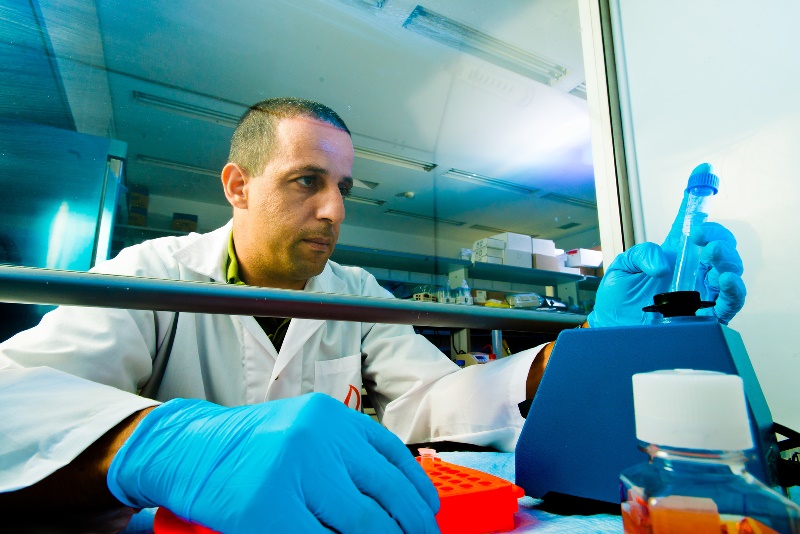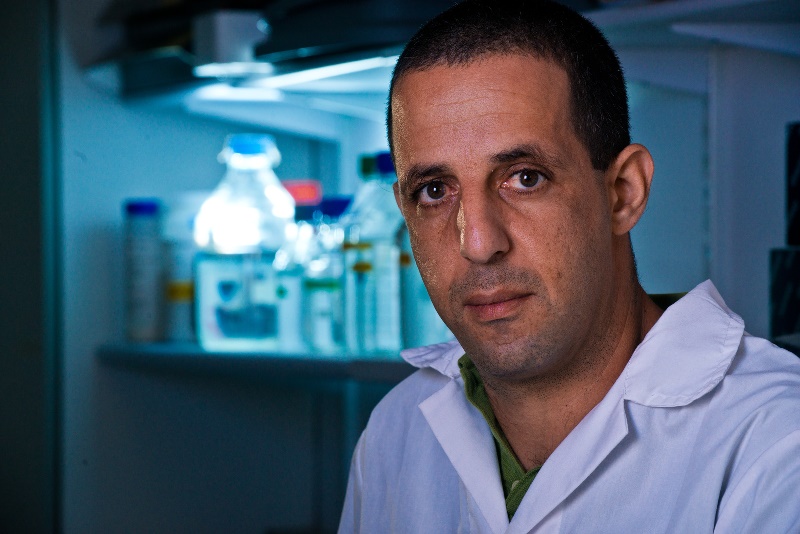"While changes to the genome can take generations of evolution, epigenetic alterations can be made almost instantly.”
Dr. Dan Levy
Dr. Dan Levy, who joined the Shraga Segal Department of Microbiology, Immunology and Genetics this year, is working to shed light on epigenetic mechanisms of gene expression. Ultimately, he hopes to translate his findings into therapeutic applications.
Epigenetics is the study of changes in gene activity that do not involve alterations to the genetic code (DNA sequence), but still get passed down. While changes to the genome can take generations of evolution, epigenetic alterations can be made almost instantly. Researchers in the field of epigenetics aim to develop drugs that will treat illness by stifling certain genes and spurring others.
Levy explains: “The cells of all living organisms contain genes which are composed of our DNA. The traits of a human being, for example, are based on the expression of approximately 80,000 different genes that determine the color of our eyes, length of our legs and speed of our metabolism, division of our cells, among countless other functions. However, our genes are not naked DNA molecules but DNA-protein complexes known as chromatin.

“Chromatin dynamics is fundamental in dictating the ’on‘ and ’off‘ state of a given gene in a given cell under a specific physiological context. Chromatin is a structure comprised of different proteins, which allows for efficient ‘packing’ of DNA. That is to say, two meters of DNA must be squeezed into a cell one micron in size but still has to be flexible enough to unwind and rewind and to maintain proper and timely organized expression of our genes.”
How do our bodies do that?
“Think of chromatin as a small nylon pouch for a rain poncho, in this case, the DNA,” he continues. “The ‘carrying case’ – the chromatin – must be flexible enough to take in yards of material and expose specific sections when needed. Scientists subject this structure to various chemical modifications that ‘sit’ on and ‘squeeze’ the chromatin, causing it to open or close genes.”
To regulate epigenetic expression, scientists like Levy study the molecular mechanisms that modulate chromatin function. One such mechanism is the addition and removal of chemical methyl groups to or from proteins. (Methyl groups are hydrocarbon groups occurring in many organic compounds.)
Levy’s expertise lies in the methylation of proteins, particularly of the amino acid lysine. “Lysine methylation is emerging as a key player in regulating epigenetic processes and is important for many physiological and biological processes in our bodies,” he says.
According to Levy, lysine methylation plays a part in the regulation of inflammation, and in diseases like AIDs, Muscular Dystrophy, autoimmune disorders, cancer and many more. “Cancer is characterized by irregular cell division,” says Levy, who discovered that one of the proteins important in cell cycle regulation is methylated. In other words, in cancer, methylation affects the ability of cells to divide or not divide.
Likewise, there is evidence that many other diseases, among them asthma, diabetes, metabolic illnesses and autism, result from defects in gene function and altered protein methylation patterns that directly affect epigenetic mechanisms. Thus, epigenetic drugs are designed to reverse aberrant gene expression connected with different diseases. Further, these drugs may provide an opportunity to develop tailor-made therapies, and may enhance the effects of combination therapy. “We must understand the epigenetic machinery in order to develop effective targeted epigenetic drugs,” says Levy.

Levy is a member of the BGU-affiliated National Institute for Biotechnology in the Negev (NIBN), where scientists conduct multi-disciplinary research guided by clear biotechnological goals. NIBN researchers seek to bridge basic science and practical application. Through the Institute, Levy is using cutting edge proteomic and genomic experimental approaches to develop tools, such as small peptide inhibitors, to inhibit enzymes that catalyze methylation. These peptides, he explains, are intended for anti-cancer applications.
The 38-year-old scientist and father of four is a second-generation BGU faculty member. His father, Joseph, is a professor emeritus of the Department of Clinical Biochemistry and Pharmacology, where he taught and has run his own research lab for more than 35 years. Since arriving in October 2012, Dan Levy has received the Marie Curie Grant from the European Commission and the BGU Faculty of Health Sciences’ Heznek award for interdisciplinary research.
Levy enjoys the University’s scientific, social and geographical environment. Terming himself a “desert person,” Levy loves the Negev for its “open spaces, quiet and peacefulness.” He teaches both medical and life sciences students and is focusing on building his laboratory, which involves recruiting students, acquiring equipment and doing experiments. “By establishing this lab,” he says, “I feel I am on a pioneering mission that will enable young researchers to enrich this university and one day give patients hope for a brighter future.”
